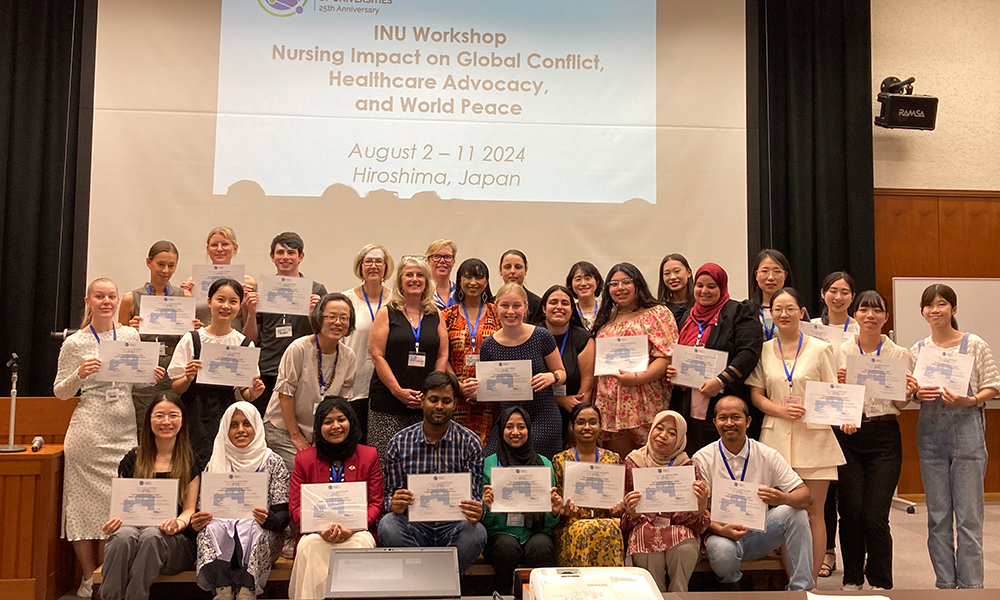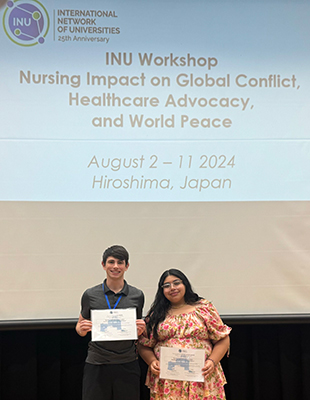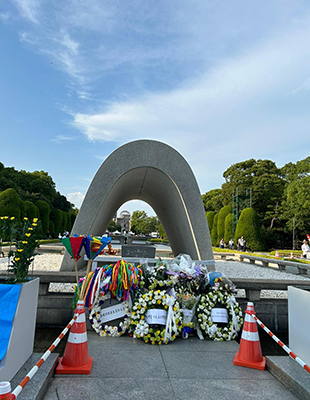Nursing students and faculty attend Global Peace seminar in Japan
College of Health and Behavioral Studies
This August, nursing students and faculty attended the International Student Seminar for Global Citizenship and Peace, hosted by Hiroshima University in Japan for the International Network of Universities (INU). The 10-day seminar welcomed students from INU member universities around the world, and students participated in workshops and lectures centered around emergency responses, natural disasters, and the commemoration of the atomic bombing of Hiroshima during World War II.

The School of Nursing invited first-generation students to apply who had never traveled outside of the country before or who had a military background. Senior Nursing students Luke Hubbard and Tatiana Sanchez were selected to attend, and they traveled with Melody Eaton, Director of the School of Nursing and Christine Argenbright, Nursing professor.
“Hearing there was an international group with students from nursing schools in different countries to learn about what they’re doing seemed really interesting,” said Hubbard, about why he was motivated to attend the workshop. “As well as its focus on global peace, taking place in Hiroshima on the anniversary of the bombing.”
Topics included global healthcare systems, safety and emergency response plans, working in conflict zones, and lectures by individuals who survived or whose family members survived the dropping of the atomic bomb in 1945.
Along with informative lectures, the seminar prioritized providing opportunities for the students to meet and collaborate with other students from around the world.
“One project was about comparing the healthcare systems of our home countries,” said Sanchez.
“It was interesting with all the different cultures seeing what’s their norm compared to ours, but as a whole, we worked very well together and learned a lot about other countries,” said Hubbard.
“I learned a lot more about universal healthcare,” said Sanchez. She heard from other students in her groups that, for example, while China offered universal healthcare, regulations vary by province, and in rural areas of Bangladesh, healthcare services are scarce.
Hubbard said student groups also identified issues they wanted to overcome in healthcare systems and made plans for how to go about it.
“The final day, we presented a project with a group of students from different countries, where we came together to talk about what works well in our countries for healthcare, what doesn’t work well, and try to come up with solutions to different points and objectives,” Hubbard said.

The most moving experience for Hubbard and Sanchez was the Peace Memorial Ceremony, in which the city of Hiroshima consoles victims of the atomic bombs and prays for lasting world peace. Sanchez shared that they saw photos of the aftermath and heard a speaker share about working as a nurse during the aftermath. “It was really impactful seeing the Prime Minister and government officials – from Japan and the US” participate in the ceremony, said Sanchez.
Other cultural immersions included visiting a sake brewery, eating traditional Hiroshima foods, and a performance of Kendo, a modern Japanese martial art.
“One of my favorites was the tea ceremony,” said Hubbard. “It was a big ceremony. The presenter dressed in the traditional clothing and showed us how to do it. That was a very powerful experience and really fun; traditional, but also very hands on.”
The students shared they took away both cultural, academic and professional lessons from the experience overall.
“I had never been out of the country before, so after an experience like this, it made me really want to learn about other countries,” said Hubbard. “Other countries have really good ideas and good healthcare systems, and I got a real appreciation of different perspectives.”
“I learned about peace, why it’s important to maintain peace, and how I can stay neutral as a nurse, because all I can do is deliver the best care possible,” said Sanchez. “My understanding of culturally competent care has expanded greatly, and I can’t wait to apply that into nursing as I graduate.”
Hubbard also appreciated traveling with the nursing faculty who attended the trip. “Dr. Argenbright and Dr. Eaton are graduate professors, so I hadn’t actually met them before this,” he said. “It was very cool spending time with them and learning more about what they do for the School of Nursing – even though we were thousands of miles away, I was learning what they do here.”
“It was everything I could have imagined and so much more,” said Hubbard.
